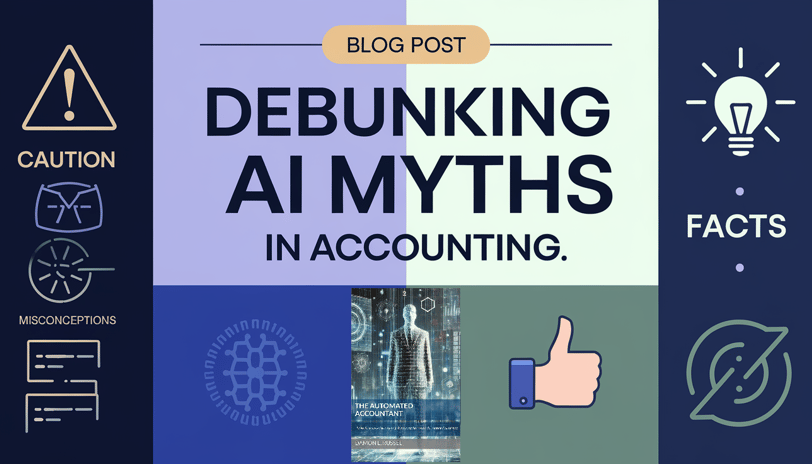Debunking Myths and Misconceptions About AI in Accounting
Explore the common myths and misconceptions about AI in accounting, including job loss fears and accuracy concerns. This blog debunks these myths and highlights why embracing AI can enhance traditional accounting practices and drive future success.
STRATEGY
Damon L. Russel
10/29/20242 min read


Debunking AI Myths in Accounting
AI is often misunderstood, particularly in industries like accounting where traditional processes have long been the norm. In this blog, we’ll debunk some of the most common myths about AI in accounting and explain why these fears shouldn’t hold you back from embracing the future.
Myth 1: AI Will Replace Accountants
One of the biggest fears surrounding AI is that it will lead to job losses. The reality is, AI is designed to enhance the capabilities of accountants, not replace them. By automating repetitive, time-consuming tasks, AI allows accountants to focus on high-value work, such as advisory services and strategic planning.
Why This Myth Is Wrong
AI is here to assist accountants, not eliminate their jobs. For example, AI can automatically categorize transactions, but it cannot build the trusted relationships that clients expect from their accountants. Human interaction is still at the heart of accounting services, particularly in areas that require nuanced understanding, judgment, and empathy. AI frees accountants from administrative burdens so they can engage more deeply with their clients and deliver more strategic insights.
Myth 2: AI Is Too Complicated for Small Firms
Another misconception is that AI is only for large firms with big budgets. However, there are many scalable AI solutions available today that make it accessible for firms of all sizes. Small firms can benefit immensely from the increased efficiency and improved client service that AI tools provide.
Why This Myth Is Wrong
Many AI tools are designed with smaller firms in mind, offering cloud-based solutions that don’t require a massive IT infrastructure or investment. For instance, there are AI-powered bookkeeping tools that are affordable and easy to use, specifically tailored for small businesses. Implementing AI doesn’t need to be an all-or-nothing endeavor—firms can start small, automating just one or two tasks, and scale up as they become more comfortable.
Myth 3: AI Isn’t Accurate
AI, like any tool, is only as effective as its implementation. When correctly set up, AI can be incredibly accurate—often more so than manual processes prone to human error. The key is to properly train AI systems and continually audit their outputs for quality.
Why This Myth Is Wrong
Proper implementation is crucial to the success of any AI system. AI can provide highly accurate outputs, particularly in repetitive and rules-based tasks, as long as it is trained with quality data. Regular reviews and audits of AI outputs are necessary to ensure accuracy, just as quality checks are needed in manual processes. In fact, with the right data, AI can reduce errors by catching inconsistencies that might be overlooked by human eyes.
What You Will Learn from The Automated Accountant:
Why AI will not replace accountants but will enhance their roles
How AI can be used effectively in firms of all sizes
The importance of proper AI implementation for accuracy
Actionable Checklist for Ethical AI Use:
Make a list of your current hesitations about AI and address them with facts.
Research small AI solutions that can benefit your firm without significant costs.
Consider pre-ordering The Automated Accountant to get deeper insights into how to leverage AI. Don’t let misconceptions hold you back—pre-order The Automated Accountant today to understand AI’s real potential. [Pre-Order Link]
Explore
Discover the AI Powered Accounting ebook series.
Connect
Learn
damon.russel@aipoweredaccounting.com
360-218-6942
© 2024. All rights reserved.
